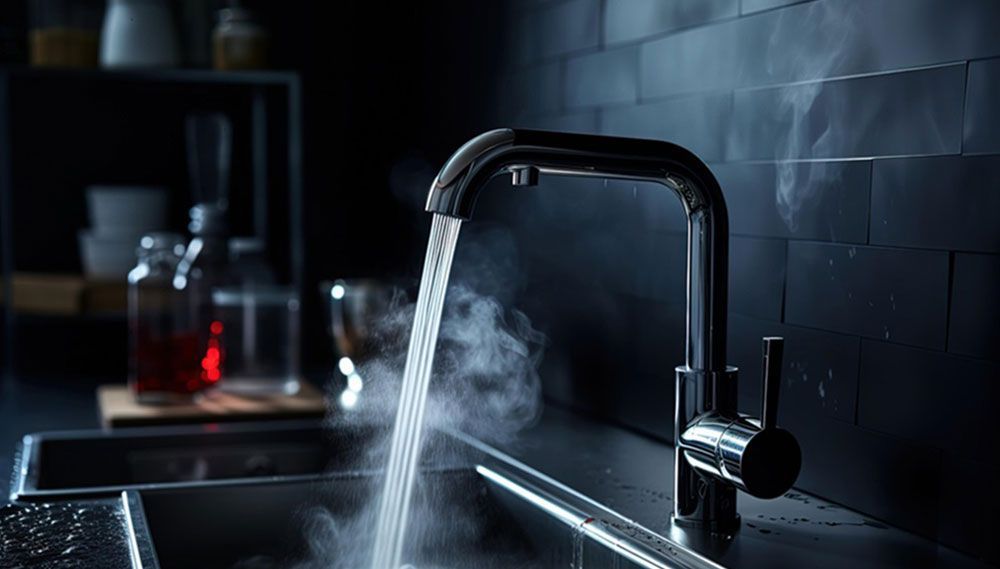The Boiling Point: Mastering the Art of Heating Water

Traditional Water Heaters: The Tried and True
Traditional water heaters, also known as storage tank water heaters, have been a staple in homes for decades. These systems consist of an insulated tank, typically ranging from 20 to 80 gallons, that continuously heats and stores hot water for on-demand use.
How They Work:
Cold water enters the tank and is heated by either electric heating elements or a gas burner. As the water is heated, it rises to the top of the tank. A thermostat controls the heating system to maintain the set hot water temperature. When you turn on a hot water tap, the hot water from the top of the tank is supplied. As hot water leaves, cold water refills the tank from the bottom. The heating system continuously reheats the water to keep a supply of hot water stored and ready for use. The thermostat controls the temperature, typically set between 120°F and 140°F, ensuring a constant supply of hot water.
Benefits:
- Cost: Least expensive, making them an attractive option for budget-conscious homeowners.
- Reliability: With a simple design and widely available replacement parts, traditional heaters are known for their dependability and ease of maintenance.
- Consistent Hot Water Supply: The storage tank ensures a readily available supply of hot water, making them suitable for households with high hot water demands.
Drawbacks:
- Energy Inefficiency: Traditional heaters continuously heat and store water, even when not in use, resulting in significant energy waste and higher utility bills.
- Limited Capacity: The hot water supply is limited by the tank size, which may not be sufficient for larger households or simultaneous high-demand activities.
- Shorter Lifespan: With an average lifespan of 8-12 years, traditional heaters require more frequent replacements compared to other types.
Tankless Water Heaters: On-Demand Efficiency
Tankless water heaters, also known as on-demand or instantaneous water heaters, have gained popularity in recent years due to their energy-efficient design and space-saving features.
How They Work:
Instead of storing hot water in a tank, tankless heaters heat water directly as it flows through the unit. When a hot water tap is turned on, the heater activates and heats the water using either a gas burner or an electric heating element. Once the tap is turned off, the heating process stops.
Benefits:
- Energy Efficiency: Tankless heaters only heat water when there is a demand, eliminating the standby energy losses associated with traditional tank heaters, resulting in significant energy savings.
- Continuous Hot Water Supply: With no storage tank, tankless heaters can provide an endless supply of hot water, making them ideal for households with high hot water demands.
- Space-Saving Design: Tankless heaters are compact and can be mounted on a wall, freeing up valuable floor space in utility rooms or closets.
- Longer Lifespan: With proper maintenance, tankless heaters can last up to 20 years, nearly double the lifespan of traditional tank heaters.
Drawbacks:
- Higher Upfront Cost: Tankless heaters have a higher initial purchase and installation cost compared to traditional tank heaters, although they can offset this expense through long-term energy savings.
- Limited Flow Rate: Tankless heaters have a maximum flow rate, which may not be sufficient for households with multiple high-demand fixtures running simultaneously.
- Potential Temperature Fluctuations: Tankless heaters may experience temperature fluctuations, especially during periods of high demand or when multiple fixtures are in use.
- Installation Requirements: Proper gas line or electrical capacity is necessary for installation, which may require additional upgrades in some homes.
Heat Pump Water Heaters: The Energy-Efficient Marvel
Heat pump water heaters are a relatively new and highly efficient technology that utilizes the principles of heat transfer to heat water. These systems are essentially a hybrid of traditional tank heaters and tankless systems, combining the benefits of both.
How They Work:
Heat pump water heaters use electricity to transfer heat from the surrounding air to the water stored in an insulated tank. The heat pump operates like a refrigerator in reverse, extracting heat from the air and transferring it to the water. This process is highly efficient, as it moves heat rather than generating it directly.
Benefits:
- Exceptional Energy Efficiency: Heat pump water heaters are the most energy-efficient option, capable of saving up to 60% on energy costs compared to traditional electric heaters.
- Longer Lifespan: With fewer components subject to wear and tear, heat pump water heaters can last up to 15 years, longer than traditional tank heaters.
- Abundant Hot Water Supply: Like traditional tank heaters, heat pump water heaters provide a consistent and abundant supply of hot water, making them suitable for households with high hot water demands.
- Environmental Benefits: By using electricity more efficiently, heat pump water heaters have a lower carbon footprint and contribute to reducing greenhouse gas emissions.
- Tax Credits and Rebates: Many states and utilities offer tax credits and rebates for installing energy-efficient heat pump water heaters, further offsetting the initial cost.
Drawbacks:
- Higher Upfront Cost: Heat pump water heaters have a higher initial purchase and installation cost compared to traditional tank heaters, although they can offset this expense through long-term energy savings and rebates.
- Installation Space Requirements: Heat pump water heaters require adequate installation space to allow for proper air circulation and heat transfer, which may be a challenge in smaller utility rooms or closets.
- Slower Recovery Time: After the hot water supply is depleted, heat pump water heaters may take longer to reheat the tank compared to traditional tank heaters.
- Potential Noise Levels: The compressor and fan in heat pump water heaters can generate noise, which may be a concern in some households.
Conclusion:
When choosing a water heater, it's essential to consider factors such as household size, hot water demand, energy efficiency goals, upfront and operating costs, and available space. While traditional heaters offer an affordable and reliable option, tankless and heat pump water heaters provide significant energy savings and environmental benefits, making them attractive choices for homeowners seeking long-term cost savings and sustainability.





